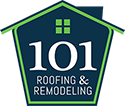For most people, their home is the largest investment that they will ever make. Beyond being a large financial investment, it is the place where you and your family live. If you own a home, performing the regular maintenance is important. Right at the top of the list for things that you should do to maintain your home is get the occasional roof inspection.
As important as roof inspections are, so many people neglect this task. It just does not occur to people until they find some type of problem with the roof. Of course, if you find damage, you want to get the roof fixed right away, but many of the most expensive repairs can be prevented by having your roof inspected on a regular schedule.
Even if you do realize that roof inspections are important, you may not know the frequency with which an inspection should be performed. The question of how often a roof should be inspected is not one that has a straightforward answer. Factors like the weather conditions and the materials from which the roof is made play a role in this determination.
Before we get into the question of getting professional inspections, there is one point that should be made. As a homeowner, you should take the time to inspect your roof on your own at least once a year. Check the condition of the shingles and go into the attic to look at the condition of the sheathing. If you see anything like missing or damaged shingles, spots where the wood looks rotted or leaks in the attic, it is time to call in a professional.
As for getting professional roof inspections when you haven’t noticed any problems, the most important factor to consider is the materials. For a roof that has composite or asphalt shingles, an inspection every three years is recommended. At the very least, you should get a roof with this type of covering checked every five years. For a roof with tile shingles, a five-year period between inspections is a good idea. Failing that, eight years is about as long as a tile roof should without an inspection.
Just because you haven’t noticed any problems, that does not mean that your roof is in good shape. Underlying issues can exist; you just haven’t noticed them yet. If left unchecked, these problems will get worse and by the time you do notice it will require repairs that are much more expensive. Scheduling the necessary roof inspections is a preventative step that ensures that small problems get caught while they are still small. This can limit the extent of the damage, reduce the cost of repairs, and prevent things like the water damage that may come from having a faulty roof.
Have any questions? We’d be happy to help! Contact 101 Roofing & Remodeling today to schedule a complimentary roof inspection.
